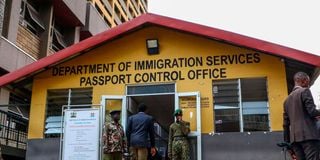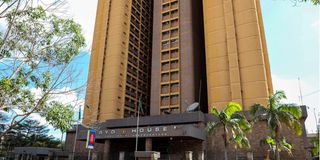A broken system: Nyayo House, the playground of passport cartels

People enter Immigration offices at Nyayo House. There are reports that no passports are being printed due to a shortage of passport booklets.
What you need to know:
- The passport issuance process is a multibillion shillings business involving control of supplies and tenders for ink, booklets and other services.
- There have been administrative changes at the passport office in attempts to break down the cartels, all unsuccessful. The corruption, sources say, has been normalised by a system and culture that has for decades abetted inefficiencies.
- Sometimes, passport application backlogs are often artificial, designed by cartels to create desperation, and therefore force applicants to pay bribes to get the documents.
Also Read:
It’s a chilly Monday morning, hundreds of Kenyans are already crowded outside the detached Nyayo House passport control office well before 8am, the official opening time for Kenya’s public offices.
Many roam about seemingly confused and holding brown envelopes with their passport application documents. Inside the room, tens of Kenyans are seated on the rows of pews as they await different passport services.
Many are here to apply for the all-important travel document, others to check on the progress of their applications filed months prior.
Three uniformed police officers manning the entrance direct most people to a queue outside a room written ‘Department of Immigration Services, Passport Control Office’.
Another queue that stretches for about 100 metres holds hundreds of Kenyans who are here for the capturing of their biometrics, a key part of the passports application process.
As it would happen, however, an hour passes without any single move on the queues. As a growing number of people grow impatient, one of the police officers manning the entrance announces “Our systems are down. If you have the patience, you can wait and see whether they will come back, but if you have other engagements for the day, you can go.”
The statement only serves to make more palpable, the confusion on the faces of men, women, girls and boys who have been on the queue since as early as 5am.
What the officer does not explain to the desperate passport seekers, however, is what scores of people entering the main Nyayo House offices every now and then, without joining the queue, and leaving after some minutes appearing satisfied, are up to if the systems are not working.
The steady stream of people, also carrying brown envelopes, enter after whispering some words to the officers at the entrance throughout the hour that the queue stays static.
“If this goes this way, I might have to use another channel as I had been advised. They told me I can get the passport within a week if I’m ready to part with Sh15,000,” a young man tells this writer rather desperately. The chilly morning was on July 24, 2023.
Fast forward to Thursday, January 25, 2024. About 10 minutes past 4pm.
Tens of Kenyans are queued inside the passport control office and more than 200 others are seated in a series of tents that have since been erected outside the office.
The tents are filled with Kenyans of all ages, elderly women and men, the youth and children, most of whom are here for capturing of their biometrics.
Another queue of tens of Kenyans line up to check on progress of their passport applications through a window where the customer service desk is stationed, though the attendant is not present.
“To track your passport, you need to come with a physical copy of this document (an invoice) and give it to the officer working here. She collects the documents and goes back to the office to track progress,” an officer serving at the desk adjacent to the customer passport-tracking service desk says.
Some have come to track progress of their applications that were filed about a year ago, and had their biometric details taken about three months ago.
The attendant says his best advice would be for the remaining people to go back home and return the following morning, to track their applications.
The passport-tracking service attendant does not appear over the one hour that we queue at the office, leaving minutes past 5pm.
But many Kenyans here seem to have come to terms with these long queues, which have been the order of the day for months, despite previous assurances from high levels in government, that the mess at the passport office would be cleared.
Interior Cabinet Secretary Kithure Kindiki made more than five visits to the passport office last year alone, including dawn surprise visits. A number of arrests were made to ostensibly restore order and efficient delivery of services at the Department of Immigration, which stands between thousands of Kenyans seeking the critical document and opportunities they seek every day.
Even by this month, there have been reports from sources within the Department of Immigration that no passports are being printed, save for those catering for emergency travel or applications by Very Important Persons (VIPs), a euphemism for senior government officials, due to a shortage of passport booklets.
The Director of Immigration, Evelyn Cheluget, in an interview with the Nation yesterday confirmed the delays with processing of passports, citing hitches in supply of materials used in production of the documents, but advising that “applicants with urgent need for travel are advised to present their proof of urgency at dedicated counters in all passport application centers countrywide.”
Ms Cheluget indicated that the Directorate of Immigration Services has since November 2023 experienced a surge in the number of passport applications due to Kenya’s labour export policy, academics and travel needs by those in diaspora during the December festive season.
“The situation has been exacerbated by delays in supply of critical materials used in passports production due to the disruption of global supply lines. The Directorate regularly replenishes passport stocks and is committed to ensure that urgent applications are expedited to enable Kenyans meet their travel plans,” she said in a statement.

Immigration Director-General Evelyn Cheluget (left) with former National Registration Bureau Secretary Reuben Kimotho at a function in Nairobi on May 23, 2023.
Welcome to Kenya’s passport office, where it has become almost impossible for citizens to access services, and where corruption has been blamed for the perpetual paralysis.
The Interior CS, Prof Kindiki, at some point last year labeled the passport office “a crime scene” and went ahead to lead a spirited campaign to eliminate cartels said to be blocking service delivery, but all this may have been in vain, at least judging by the current state of affairs.
Several Kenyans we interviewed for this article indicated that despite applying for the critical document months ago, they were yet to secure it.
Our investigations since last year showed that the paralysis of services at the passport office have more to do than just pending bills and simple extortion by brokers outside the Department of Immigration Services, as senior government officials claim. It’s an intricate network of deep-rooted corruption cartels, feared even within government and unapproachable within the Department of Immigration.
And this lifts the lid on the reasons behind suffering Kenyans face in their search for the crucial travel document, with many missing travel opportunities even as senior government officials pay lip service to providing a lasting solution.
Corrupt officials at the Department of Immigration have made it their business to make a killing from providing a public service that Kenyans have not only paid for through taxes but also through payments they make while applying for the passports.
Another applicant who needed four passports to enable him travel with his family to an African Country, had to part with over Sh60,000 in bribes to avoid missing travel deadlines last year.
The man had initially applied for four 66-page passports, well in good time before travel deadlines could catch up with him, but, to his surprise, months passed before he could secure the documents and he was risking missing on the family travel plan.
He told the Nation that he sought the intervention of a relative holding a senior position within Nyayo House, but even the relative was unable to have the documents processed on time.
He was forced to seek the help of a cartel of brokers that has captured operations at the Department, in the end spending Sh80,000, as opposed to Sh18,200 that was required to apply for four 32-page passports, since he was informed that 66-page passport booklets were unavailable.

Nyayo House, Nairobi. Interior CS Kithure Kindiki has been compelled by pressure from all corners of society to commit to cracking down on Nyayo House graft cartels.
Once you have your way with the cartels, the source said, you receive VIP treatment and you walk in past hundreds of Kenyans queuing desperately and never knowing that their chances of securing the crucial document without paying a bribe are near zero.
The passport issuance process is also a multibillion shillings business involving control of supplies and tenders for ink, booklets and other services. There have been administrative changes at the passport office in attempts to break down the cartels, all unsuccessful.
And the corruption, sources say, has been normalised by a system and culture that has for decades abetted inefficiencies.
Sometimes, passport application backlogs are often artificial, designed by cartels to create desperation, and therefore force applicants to pay bribes to get the documents, our sources said.
On August 25 last year, the Directorate of Criminal Investigations (DCI) arrested four persons on suspicion of facilitating corruption, by helping rogue immigration officials collect bribes from desperate passport seekers.
The four were arrested in a crackdown on corruption cartels at the office, which had led to a backlog of applications, estimated at 58,000 passports by August 24, 2023.
“Part of our problem in the processing of passports is a corruption problem. We have a problem with immigration. If need be, we’ll seal off the place and declare it a scene of crime,” Prof Kindiki told MPs at the time.
“There are good officers who are there serving the country very patriotically, but there are others there collecting bribes and harassing the people of Kenya, to get services which they should be getting for free and as their right,” the minister said.
The CS promise was, however, an extension of his series of promises that had started months earlier, when he vowed to end the mess at Immigration within the first three weeks of June.
At the time, the backlog of passport applications was 42,000, but then it grew to 58,000 by August.

Kenyans at the Immigration Department at Nyayo House, Nairobi on September 1, 2023.
Prof Kindiki conducted dramatic surprise visits at the passport office for weeks last year, at some point even promising that Kenyans would start getting the documents within two weeks of application, but on the ground the state remains far much the same.
Passport-seekers with deep pockets, however, have a shortcut since they can get the document quickly and without much hustle, through a cartel that operates through the ‘VIP’ application channel.
The VIP application centre is reserved for senior government officials and their families, and is complete with a small biometric capturing unit and a photo studio.
The Nation observed queues of non-VIP applicants being ushered discreetly into office, where they were received by the aides of senior Immigration officials. These applicants often received their passports within a day after paying bribes.
The corruption cartel is organised in a web that starts from the brokers who hang around the premises on ground floor.
These hordes have established very strong networks with Immigration officials on the upper floors and the clerks on the ground floor.
They act as conveyor belts by soliciting, receiving and delivering bribes, and then ensuring that the passports are prioritised for printing and delivering the documents to the applicants.
Emboldened by the broken system here, these cartels hibernate for a few days whenever there is a crackdown against them.
The crackdowns, sources observe, only shock the system but they never change the culture, and rarely are there any meaningful amendments to processes, or the prosecution of senior officials who sit at the top of the corruption value chain.
That explains why every interior minister in recent times, from Dr Fred Matiang’i to Maj-Gen (Rtd) Joseph Nkaissery to Joseph Ole Lenku and others before them, have often vowed to crash the cartels at Nyayo House but scarcely had any long-lasting effect.

Interior CS Kithure Kindiki during a visit at Nyayo House Immigration Department on September 1, 2023, following public outcry over delays in passport application process.
The blockade that started last year was reported to have been caused by wars between old and new crop of cartels with one team trying to forcefully get in, forcing the other to sabotage operations.
Late last year, Immigration PS Julius Bitok promised the extension of crackdowns on cartels at the passport offices, across the department’s regional offices at Mombasa, Kisumu and Kisii.
“I want to assure Kenyans that we are going to make Nyayo House a place where you can expect to be served diligently without having to know anyone or parting with bribes,” the PS said at the time.
Meanwhile, months after the many promises made by the CS and his PS, queues remain at the passport office and as Kenyans turn desperate, the state of affairs at the Immigration Department continues to stand in the way of the government’s objective to multiply the number of Kenyans holding passports from 3.5 million to 10 million in five years.
This means that more Kenyans continue to miss out on education, job and other opportunities, due to inefficiencies at the passport office.
The notorious corruption cartels at the department that is a key link between Kenya and the outside world continue to stall services for thousands of citizens.
“These are people whose ways of operating are really tough to crack, even officials within the Ministry have been going almost through a similar predicament,” said a source from the Interior Ministry.
Also Read:
Have you been frustrated while seeking government services? Would you like to share your story? Please get in touch with us at [email protected]. Use “Feedback” as the subject.





